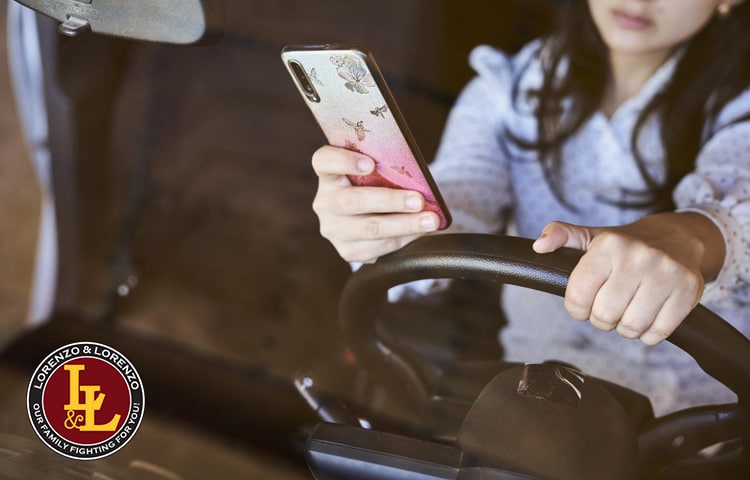Texting and driving, a form of distracted driving, is increasingly becoming a major cause of car accidents in Florida and throughout the U.S.
Just look at these recent texting and driving statistics:
- In 2020, a total of 3,142 lives were lost across the U.S. as a result of distracted driving, according to the National Highway Traffic Safety Administration (NHTSA).
- In Florida alone, 333 people were killed in 2021 in crashes involving distracted driving—the highest number recorded in Florida for the last 8 years.
To try to combat this growing issue, Florida updated their texting and driving laws in 2020, but the impacts of these changes still aren’t fully known.
At Lorenzo & Lorenzo, we wanted to help bring awareness to this important topic, so we decided to make it the focus of our college scholarship essay contest.
While we could only pick one winner—Hannah Neymeyer from Concordia University Wisconsin—we also wanted to highlight some of our favorite responses from other students who participated in this year’s contest.
Here are some of their answers to the prompt:
Florida updated their texting and driving laws in 2020. Please assess the new laws, how the new laws impact drivers, and if you believe this law will be beneficial for driver safety.
Hannah Neymeyer, a junior at Concordia University Wisconsin
“Technology was originally created to bring promise and advancement to society, but from it a new weapon was created in the form of texting and driving. The only way to combat distracted driving is to add stricter restrictions to cell phone usage while driving, which is what Florida has done with its new 2020 texting and driving laws. The laws signed into effect by the governor of Florida made texting and driving a primary offense, allowing law officers to pull over and issue tickets to drivers solely for texting and driving (City of Miami Springs Florida, 2019). Before the addition of this law the use of cellular devices while driving was only a secondary offense, meaning a driver could only get cited for texting and driving if they violate a primary offense (City of Miami Springs Florida, 2019). The other addition to the Florida texting and driving laws is the ban of using handheld wireless communication devices while in a school or work zone (FLHSMV, 2021). These two new laws will help restrict the use of cellular devices while driving which in return will reduce the number of accidents caused by texting and driving.”
Tyren Neasman from Florida A&M University
“One simple action has led to thousands of deaths worldwide. Yet, while most relate this idea with warfare, disease, or old age, this simple action, unlike the others, can be simply preventable – reaching for your phone.”
“If you are driving 55 miles per hour while looking at your phone for 5 seconds to send a text message, you would have traveled the length of a football field. That’s all it takes – 5 seconds. The Centers for Disease Control found an estimated 3,000 deaths are due to distracted drivers every year. With 1 in 3 teens admitting to texting while driving, resulting in 58% of teenagers’ crashes, the problem needs to be addressed.”
“Reaching for a phone has killed far too many, and it is time that we as a society decide not to allow these preventable deaths to occur at the hands of wireless communication devices.”
Sharon Kok-Pollock from University of Phoenix
“Even though not many tickets are issued for texting and driving in Florida, this is still a good start to prevent fatalities. The fine needs to be higher and the consequences stricter for drivers to take this law seriously.”
“Texting and driving are no different than driving drunk, as you are not aware of your surroundings. It only takes a second not to be mindful of your surroundings for a significant accident.”
Katherine Kustes from University of Iowa
“In 2020, distracted driving laws changed when Florida made texting while driving a primary offense. Governor DeSantis signed a bill allowing police to pull over and issue a citation to any motorist who was seen using a mobile device behind the wheel. Although this new law is necessary, it does not solve the phenomenon of distracted driving nor does it fully protect individuals who have been injured or killed in collisions. Under the new law, a distracted driver would receive a $30 fine after the first offense and $60 fine for a second offense. If a crime is punishable by a fine, it is virtually legal for the rich. A small fine might make a financial dent for a low-income individual, but a wealthy individual would barely feel any burdens imposed by the consequences laid out by this law. Even if fines for distracted driving increase by hundreds or thousands of dollars, financially stable individuals would not be incentivized to follow such laws. Although the implementation of the law became effective January 1, 2020, distracted driving still remains a prevalent issue in the state of Florida. Distracted driving resulted in 48,488 motor vehicle collisions and took 299 lives. It is clear that laws punishable by fines are not as effective as they need to be in order to prioritize public safety.”
“Florida laws must change to make distracted driving a crime punishable by jail time. Imposing jail time on individuals who are pulled over for distracted driving means that nobody can buy their way out of a crime.”
Micki Lewis from University of Phoenix
“In 2020, Florida updated their texting and driving laws to make it a primary offense. Under the new law, there are fines and court fees for those that violate the law.”
“The fees are pretty low and there are ways to avoid fines and points so drivers will still text and drive. I strongly believe that if they were caught texting in a school or construction zone, there should not be a way to avoid fines and penalties. They should be fined and points should be added for the first offense and if there is a second offense, the consequence should be harsher.”
Kesha Sterling from University of Phoenix
“While the intent of the law is sound. There is no way to truly make someone not handle their phone while driving if they really want to. There would have to be a built-in device in a car that prevents the car from moving if a cell phone is in use. While I applaud the Governor for taking action to affect the senseless loss of life that occurs because of texting while driving, I am not sure it is effective. This new law is only beneficial to drivers’ safety if they comply.”
Jacob Siebanoller from Sam Houston State University
“This new law does not go overboard, and it achieves this by modifying an existing law in a way that is difficult to argue against. Texting while driving was already deemed illegal in Florida and upgrading it to have a ‘primary offense’ status to further encourage driver safety is a revision that any reasonable person can agree with. Other than that, all the exceptions and the exceptions to exceptions remained the same, refraining from complicating the language or encroaching on the privileges already entrusted to drivers. By not touching these previously established guidelines, the new law continues to maintain that necessary equilibrium between leniency and strictness. While this change is only minor in the bigger picture, it makes an essential revision without needlessly adding or subtracting anything.”
Grace Schuler from Drexel University
“Here is my idea: How about an invention to help lower the temptation to drive while texting. I believe installing a device similar to the ignition interlock breathalyzer that would prevent your car from starting until you listened to/viewed the following check list could be helpful.”
“Perhaps another idea is to develop a steering wheel that requires both hands. When both hands are not on the wheel, you have three seconds before an ear-piercing sound emits? Kind of kidding, but maybe not.”
“While I am not sure that a specific invention or device can make someone take more personal responsibility regarding texting and driving, I do believe paying a real price for not following the rules are keys to stopping the problem.”
Whitney Berry from Blue Ridge CTC
“I believe the Florida texting and driving laws in 2020 are beneficial for driver safety. The next step is enforcement. The laws become meaningful when the police enforce such laws. It takes an effort of law enforcement and public awareness to change people’s behaviors. As with many things, if society rejects a practice, a person will likely change what they do. Add to that a hefty fine and change will hopefully be coming.”
Check back soon to enter our next essay contest
Thanks to everyone who participated in this year’s scholarship essay contest!
If you missed the deadline for this contest or would like to apply for a future scholarship, please visit our scholarship page to review the prompt question, eligibility criteria, deadline and application instructions. Good luck!








